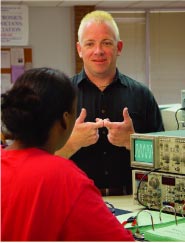
Rehabilitation of Individuals Who Are Deaf or Hard of Hearing
An important personal
quality of effective Deafness Rehabilitation Professionals and Interpreters
for Deaf Individuals is an appreciation for the value of communication
and its impact on people’s lives. An essential professional quality is
to be aware of the varied needs of deaf individuals and familiar with
the unique characteristics of the Deaf culture and community.
Services provided by Deafness Rehabilitation Professionals
include assessment, vocational and adjustment counseling, interpreter
referral, advocacy, job placement, and independent living skills training.
Interpreters for Deaf Individuals help meet the needs
of individuals who are deaf or deaf-blind through manual, tactile, oral,
and cued speech interpretation. Both often assist individuals in legal,
medical, and other settings in the community.
A critical factor for success is the ability to communicate with each
individual in his or her preferred mode of communication. These professionals
are skilled in using several methods of communication such as American
Sign Language (ASL) and Pidgin Signed English (PSE). Familiarity with
the use of various assistive listening devices is helpful.
Preparation
Many states require a master's degree for employment as a Deafness Rehabilitation
Professional. While many agencies may hire graduates from general rehabilitation
counselor training programs, employment opportunities are greater for
those who have graduated from programs offering master's degree specialization
related to deafness or services for people who are deaf or hard of hearing.
Some colleges and universities offer stipends or scholarships to students
interested in pursuing careers in providing specialized rehabilitation
to people who are deaf or hard of hearing.
Interpreters for Deaf Individuals can receive training in public and private
agencies, schools, and other institutions. A college degree is not always
required, but is often preferred by employers.
Certification
Deafness Rehabilitation Professionals are eligible for the same types
of certifications as vocational rehabilitation counselors. These include
Commission on Rehabilitation Counselor Certification (CRCC), Nationally
Certified Counselor (NCC) and others. Many states and programs are implementing
sign language proficiency evaluations to assist professionals in developing
and improving their American Sign Language skills. While certification
in sign language proficiency is not currently required, national certification
or state screening levels for sign language proficiency are often stated
as a hiring preference.
To work as an Interpreter for the Deaf, state or national certification
is required. National certification is through the Registry of Interpreters
for the Deaf (RID). States use a variety of screening instruments.
Opportunities
Deafness Rehabilitation Professionals and Interpreters for Deaf Individuals
may be employed in a variety of settings including vocational rehabilitation
agencies, universities, community rehabilitation programs, mental health
settings, independent living agencies and community service centers.
Find
out more about Vocational Rehabilitation
(Excerpts from the
Careers in Vocational Rehabilitation Booklet)
Who
makes a good rehabilitation professional?
Preparing for a Career in Vocational Rehabilitation
Questions about a Career in Vocational Rehabilitation
Vocational
Rehabilitation Professions:
Rehabilitation
Counseling
Rehabilitation Counselors
Rehabilitation of Individuals Who Are Blind
or Have Vision Impairments
Orientation and Mobility Specialists
Rehabilitation Teachers
Vocational Evaluation and Work Adjustment
Vocational Evaluators
Work Adjustment Specialists
Job Development and Placement Specialists
Rehabilitation of Individuals who are Deaf or Hard
of Hearing
Deafness Rehabilitation Professionals
Interpreters for Deaf Individuals
Undergraduate Education in the Rehabilitation
Services
Rehabilitation Practitioners
Rehabilitation Administration
Other Vocational Rehabilitation Professions
Rehabilitation Medicine, Physiatrists, Rehabilitation Nurses
Prosthetics & Orthotics
Rehabilitation Technologists
Rehabilitation Psychologist
Speech-Language Pathologists and Audiologists
